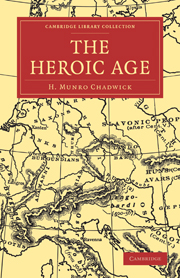Book contents
- Frontmatter
- PREFACE
- Contents
- DEDICATION
- CHAPTER I THE EARLY NARRATIVE POETRY OF THE TEUTONIC PEOPLES
- CHAPTER II THE HEROIC AGE OF THE TEUTONIC PEOPLES
- CHAPTER III SCENE AND NATIONALITY IN THE HEROIC STORIES
- CHAPTER IV THE ORIGIN AND HISTORY OF THE HEROIC POEMS
- CHAPTER V THE POETRY AND MINSTRELSY OF EARLY TIMES
- CHAPTER VI SUPERNATURAL ELEMENTS IN THE HEROIC STORIES
- CHAPTER VII MYTHICAL ELEMENTS IN THE HEROIC POEMS
- CHAPTER VIII THE USE OF FICTION IN THE HEROIC POEMS
- CHAPTER IX THE HEROIC AGE OF GREECE
- CHAPTER X THE HOMERIC POEMS
- CHAPTER XI EARLY GREEK POETRY AND MINSTRELSY
- CHAPTER XII SUPERNATURAL ELEMENTS IN THE HOMERIC POEMS
- CHAPTER XIII MYTH IN THE HOMERIC POEMS
- CHAPTER XIV FICTION IN THE HOMERIC POEMS
- CHAPTER XV THE COMMON CHARACTERISTICS OF TEUTONIC AND GREEK HEROIC POETRY
- CHAPTER XVI SOCIETY IN THE HEROIC AGE
- CHAPTER XVII GOVERNMENT IN THE HEROIC AGE
- CHAPTER XVIII RELIGION IN THE HEROIC AGE
- CHAPTER XIX THE CAUSES AND ANTECEDENT CONDITIONS OF THE HEROIC AGE
- ADDENDA ET CORRIGENDA
- INDEX
- Plate section
CHAPTER XIII - MYTH IN THE HOMERIC POEMS
Published online by Cambridge University Press: 07 September 2011
- Frontmatter
- PREFACE
- Contents
- DEDICATION
- CHAPTER I THE EARLY NARRATIVE POETRY OF THE TEUTONIC PEOPLES
- CHAPTER II THE HEROIC AGE OF THE TEUTONIC PEOPLES
- CHAPTER III SCENE AND NATIONALITY IN THE HEROIC STORIES
- CHAPTER IV THE ORIGIN AND HISTORY OF THE HEROIC POEMS
- CHAPTER V THE POETRY AND MINSTRELSY OF EARLY TIMES
- CHAPTER VI SUPERNATURAL ELEMENTS IN THE HEROIC STORIES
- CHAPTER VII MYTHICAL ELEMENTS IN THE HEROIC POEMS
- CHAPTER VIII THE USE OF FICTION IN THE HEROIC POEMS
- CHAPTER IX THE HEROIC AGE OF GREECE
- CHAPTER X THE HOMERIC POEMS
- CHAPTER XI EARLY GREEK POETRY AND MINSTRELSY
- CHAPTER XII SUPERNATURAL ELEMENTS IN THE HOMERIC POEMS
- CHAPTER XIII MYTH IN THE HOMERIC POEMS
- CHAPTER XIV FICTION IN THE HOMERIC POEMS
- CHAPTER XV THE COMMON CHARACTERISTICS OF TEUTONIC AND GREEK HEROIC POETRY
- CHAPTER XVI SOCIETY IN THE HEROIC AGE
- CHAPTER XVII GOVERNMENT IN THE HEROIC AGE
- CHAPTER XVIII RELIGION IN THE HEROIC AGE
- CHAPTER XIX THE CAUSES AND ANTECEDENT CONDITIONS OF THE HEROIC AGE
- ADDENDA ET CORRIGENDA
- INDEX
- Plate section
Summary
It is commonly held that history, myth and fiction have all contributed to the formation of the Greek heroic stories; but opinions differ widely as to the relative importance to be attributed to the three elements. Among modern scholars the general tendency has been to assign the chief weight to myth. By many indeed the heroes of the Trojan War are believed to be as mythical in origin as the gods themselves.
One conclusion may safely be drawn from the Northern evidence discussed in the last chapter: we must definitely dismiss the argument that the Homeric heroes cannot have been men of flesh and blood because they are brought into contact with the gods. No one will be so hardy as to suggest that King Haakon or his namesake, the famous earl of Lade, were products of myth or poetic imagination. Yet Göndul is as much responsible for the death of King Haakon as Athene is for that of Hector. There is certainly this difference between the two cases, that we have no historical evidence for the existence of the Homeric heroes. But the fact that deities participate in their destruction does not in itself prove that they are themselves products of myth or fiction.
There was a time, not so very long ago, when most of the characters of the Greek Heroic Age were believed to owe their origin to nature-myth–personifications of light, darkness and so forth.
- Type
- Chapter
- Information
- The Heroic Age , pp. 263 - 291Publisher: Cambridge University PressPrint publication year: 2010First published in: 1912



